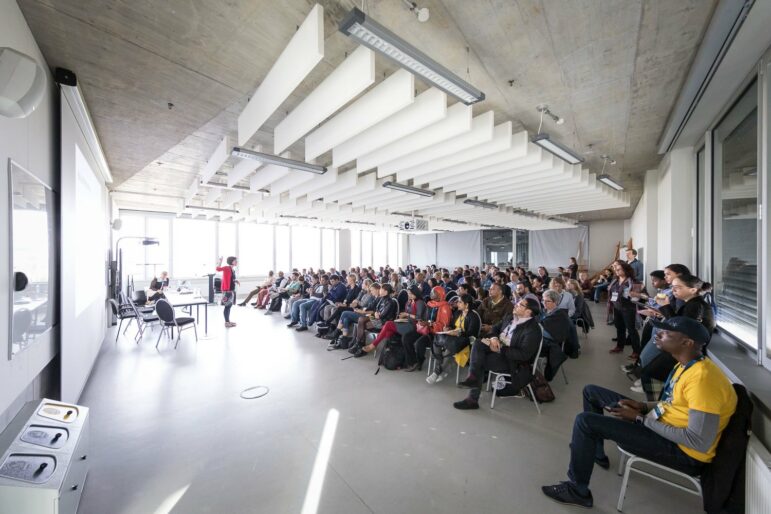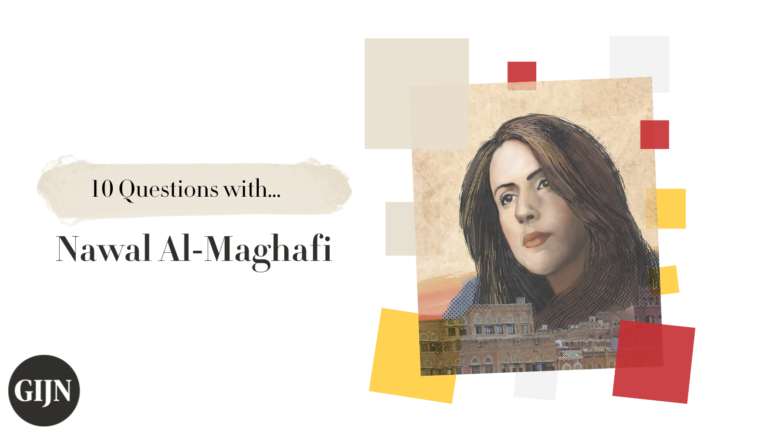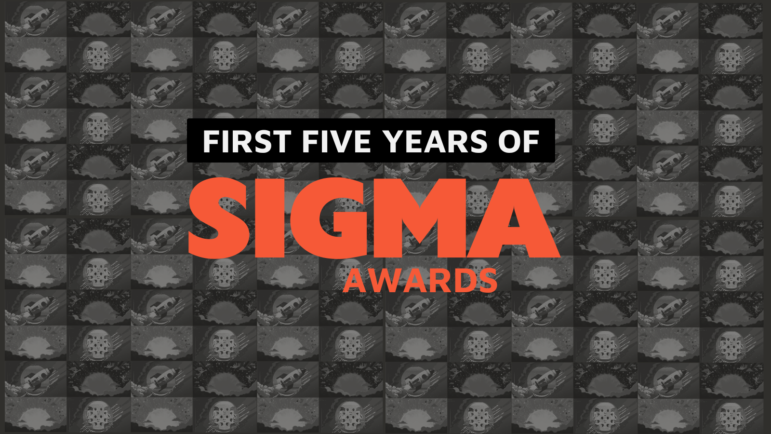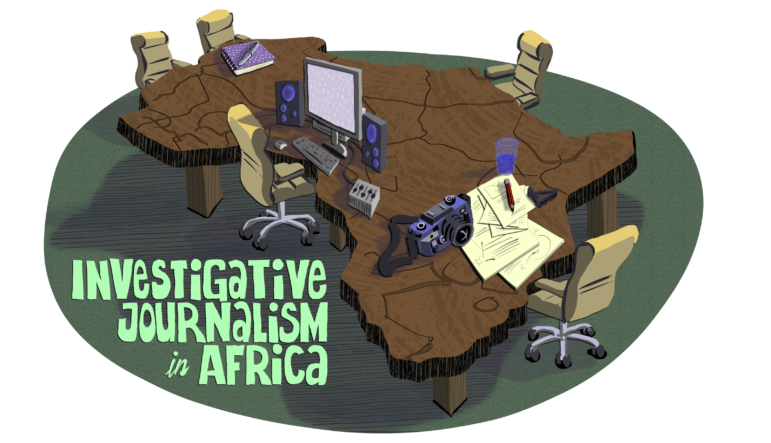
Research
Climate Change Reporting and Mental Health: Practical Tips for Newsrooms and Journalists
In a recent Reuters Institute webinar, experts discussed the latest research into the impact of climate reporting on journalists’ mental health.
Investigating caste issues is crucial for understanding India’s socioeconomic dynamics and addressing systemic inequalities.
This digital book version of our reporting guide includes expert analysis and practical advice to enable better investigations of the fossil fuel industry.
The UN process for evaluating national human rights records is long and complex, but offers valuable material for journalists.
This guide provides watchdog journalists with key context and practical advice to enable better investigations of the fossil fuel industry.
A comprehensive list of national, regional, and global reporting grants and fellowships.
Featuring advice on fact checking, digital security tips, interview techniques, and guidelines for editors.


Empower the World’s Watchdog Journalists

The GIJN Bulletin is free and distributed to journalists in more than 100 countries


Journalists of color based in the United States can apply for the Investigative Reporters and Editors (IRE)’s Chauncey Bailey Journalist of Color Investigative Reporting Fellowship. The year-long program aims to prepare and support a journalist of color for a career in investigative reporting, and provides training and mentorship, as well as support to attend IRE trainings, Data Journalism Bootcamps, a NICAR conference, the IRE annual conference, and other benefits. Fellows receive a one-year IRE membership or renewal, conference registrations, travel stipends, and more. The deadline to apply is September 1, 2025.
In a letter coordinated by the Committee to Protect Journalists (CPJ) and Reporters without Borders (RSF), more than 130 global leaders of news and press freedom organizations called on world leaders, governments, and international institutions to ensure journalists from outside Gaza are given immediate access to the territory. The letter also demands the protection of Palestinian journalists currently reporting under siege in the territory. For almost 20 months, Israeli authorities have prevented international media from entering Gaza, except for brief excursions. “Access must be restored, and the rights of journalists must be respected,” said CPJ CEO Jodie Ginsberg.
Source: Daphne Caruaza Galicia Prize for Journalism
The fifth edition of the Daphne Caruana Galizia Prize for Journalism is now open for submissions. Professional journalists, individually or working in teams, may submit their work for consideration by July 31, 2025. The Prize honors outstanding journalism that defends core values of the European Union, such as human dignity, freedom, democracy, the rule of law, and human rights. The winning submission will be selected by an independent jury, and the €20,000 annual prize will be awarded in October 2025 at the European Parliament in Strasbourg, as a symbolic reminder of the date of Caruana Galizia’s assassination.
Security forces of the Kyrgyz government have arrested, detained, and relocated for interrogation numerous journalists from GIJN member Kloop media in the past two days. Authorities conducted coordinated raids targeting at least eight individuals, including current and former Kloop editorial staff. These journalists were also denied access to legal representation for hours and some were accused of "inciting mass unrest," though no formal charges have been filed as of now. “The detention of Kloop journalists is yet another stark example of how Kyrgyzstan’s security apparatus is being used to crush dissent and dismantle independent journalism. These actions are clearly intended to intimidate critical voices," said Marie Struthers, Amnesty International’s Director for Eastern Europe and Central Asia.
Five US-based press freedom organizations — the Committee to Protect Journalists, Freedom of the Press Foundation, International Women’s Media Foundation, PEN America, and the Reporters Committee for Freedom of the Press — announced the launch of a network to provide legal, safety, and training resources to journalists and newsrooms in the United States. They noted that requests for assistance from journalists and newsrooms have increased significantly. “Journalists and newsrooms from across the country are increasingly concerned about a raft of measures and actions that threaten press freedom in the United States,” said CPJ CEO Jodie Ginsberg.
The EU Investigative Journalism Award, organized by Thomson Media, is part of the EU-funded project “Strengthening Quality Journalism in Western Balkans and Türkiye II.” The award is open to journalists from the Western Balkans and Türkiye, for stories published in 2024. Submissions should “contribute to transparency, accountability, and the public interest” and cover topics such as corruption, organized crime, extremism, foreign influence, and human rights violations (including digital rights). The first, second, and third place winners will receive €5,000, €3,000, and €2,000, respectively. The deadline is June 16.
In an audience with some of the 6,000 journalists who traveled to Rome to cover the papal election, Pope Leo XIV called for the release of imprisoned journalists and affirmed the “precious gift of free speech and the press.” He also expressed solidarity with journalists who have been jailed for reporting the truth. “The church recognizes in these witnesses — I am thinking of those who report on war even at the cost of their lives — the courage of those who defend dignity, justice, and the right of people to be informed, because only informed individuals can make free choices,” he said.
Source: Global Fund for Media Development
The Next-IJ Cross-Border Investigative Training Program is accepting applications for its July 2025 session. The day-long, online intensive program on July 18 is designed to enhance investigative reporting capabilities through practical, hands-on learning and will be led by expert investigative journalists and researchers from OCCRP and Transcrime–Università Cattolica del Sacro Cuore in Milan. Applicants must be based in or affiliated with one of the “Creative Europe” countries — EU member states plus Iceland, Norway, Liechtenstein, Serbia, Montenegro, Bosnia and Herzegovina, Albania, North Macedonia, Kosovo, Ukraine, Georgia, Moldova, Armenia, and Tunisia.
Almost three years after Palestinian-American journalist Shireen Abu Akleh was lethally shot while covering an Israeli Defence Forces (IDF) operation in the West Bank, a new documentary produced by Zeteo claims it has uncovered evidence that enabled them to identify the Israeli soldier who shot her. The IDF said in 2022 that it was not possible to “unequivocally determine” the source of the gunfire. According to “Who Killed Shireen,” the 20-year-old Alon Scagio fired the fatal shot. Scagio was transferred to another unit following the IDF's investigation into the shooting, and was killed by an explosive in the West Bank town of Jenin in 2024.
The journalism department at Wits University in Johannesburg has opened the call for fellowship applications for AIJC2025, which will be held from 5-7 November. This year AIJC is running two fellowship tracks: one for early-career journalists under the age of 30 with five or fewer years of experience, and one for mid-career journalists with five or more years of experience, and also welcomes applications from freelance journalists. The fellowship covers major travel costs, shuttles, accommodation, conference fees, and meals. The deadline for applications is May 23, 2025.

Pulitzer Prize-winning reporter Connie Walker discusses her favorite podcast tools, the ‘radical transformation’ of how Indigenous issues are covered, and building trust with sources.

The investigative journalist — who has covered Iraq’s secret sex trade, the Yemen war, and the Sanaa funeral bombing — shares insights from working on a difficult beat.

Brazilian freelance reporter Hyury Potter recently won the Pulitzer Center’s Breakthrough Journalism Award.

In a career spanning more than 20 years, Le Monde reporter Stéphane Horel has brought a creative and, at times, humorous approach to groundbreaking environmental investigations.

After five years and 2,875 project entries from more than 100 countries, the Sigma Awards have become a catalyst for innovation and forever changed the face of data journalism.

Ten outstanding data-driven journalism projects, from as many countries, were chosen by a diverse Prize Committee of 17 judges from 498 entries from 80 countries.

GIJN, the new home of the Sigma Awards, is proud to announce the 2025 shortlist for the best data journalism projects and portfolios in the past year.

The US government’s detained immigrant population flatlined in April, but there’s more to the numbers than meets the eye. Here’s what journalists need to know about the data.

The Philippine Center for Investigative Journalism, a GIJN founding member, has grown from a one-room news startup 36 years ago to a seminal force for watchdog reporting.

The team at the award-winning data journalism outlet suspected that Russia would invade — they could see clues in the data. We profile the team and their work combating false conflict narratives.

In the aftermath of a car bombing that killed one of Malta’s leading investigative reporters, her family set up an organization to fight for justice and ensure her legacy lives on.

The nonprofit newsroom — whose founders and senior leadership are all women — has taken a innovative, youth-focused approach to covering corruption.

Our third regional spotlight series examines the challenges facing our members and other outlets in the Middle East and North Africa, such as war, backsliding democracies, self-censorship, exile, surveillance and imprisonment of journalists, and the hostile legal environment — and why this reality on the ground makes investigative journalism there all the more essential.

Our second regional spotlight series examines the successes and challenges facing our members in Africa and others reporting from the continent. These articles tell the stories of growing journalistic collaboration, courage, and innovation in the face of repression, legal intimidation, lack of access to information, and even physical threats.

Our first regional spotlight series celebrates the achievements of our members in Latin America and others reporting from the region. These articles tell the stories of reporters across the continent, digging into the investigations that matter, and detailing how outlets are creating innovative reporting projects amid their own specific local challenges.

Global elections in 2024 will affect more citizens than in any previous year, and will likely reset humanity’s liberty compass for years ahead. This project features an elections reporting guide, stories on cutting-edge tools for investigating campaigns and candidates, and lessons learned from the best in local watchdog reporting from around the world.
A webinar exploring how investigative journalists can document human rights abuses in war zones, with a focus on methods to ensure the information gathered can later be used by legal investigators or international courts.
Satellite imagery has become a game-changer for investigative journalism, offering powerful tools to uncover hidden stories.
The 2024 elections marked a seismic year for democracies worldwide, presenting investigative journalists with unique challenges and opportunities.
In Africa, more than in most other parts of the world, the hurdles that journalists have to overcome to report beyond their own countries or continent are numerous.